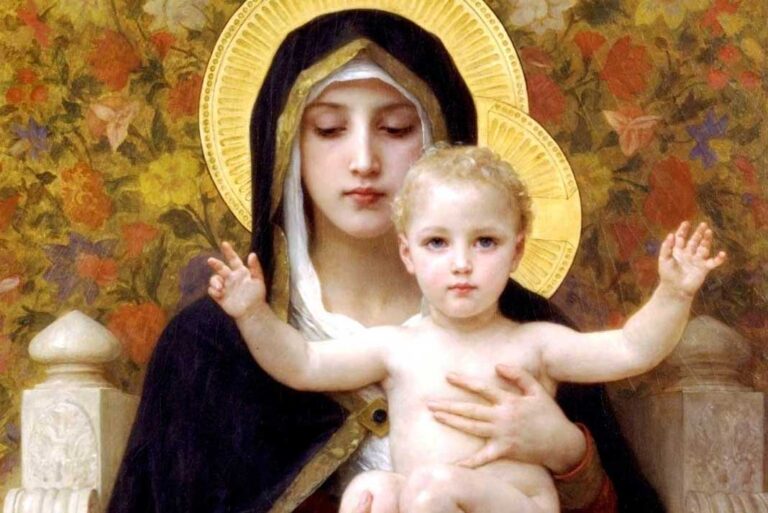The following is a Facebook discussion that I tripped into one evening. Over the course of a couple days, the conversation developed until I felt compelled to offer a constructive rebuttal to the false doctrine of Immaculate Conception (the Catholic doctrine that Mary had to be without sin so our Lord could be born into our fallen world through a pure vessel.) I’ve reconstructed that conversation below.
Initially, JL posted the following graphic. The caption reads, “If the land that Jesus walked on is holy, imagine the womb that bore Him.” This obviously pins upon a very literal interpretation of Jerusalem’s romantic “Holy Land” title, forgetting Jerusalem is also called “Sodom and Egypt.” (Revelation 11:8)

[MD] Required an Immaculate Conception
[JL] So few nonCatholics get that. Actually a lot of Catholics don’t even get it! Thanks for being aware.
[CA] JL, isn’t that why she’s called the ‘Virgin’ Mary?
[JL] CA, No. She was a dedicated virgin before she was incarnated by the Holy Spirit. Immaculate Conception means she was conceived without original sin inside her mother’s womb. So she never had to suffer the effects of original sin like the rest of us. God did this so she would be a pure vessel for His Son to be nurtured and grown in.
[MD] CA, Original sin is Eve’s disobedience and she and Adam eating the forbidden fruit. It was taught that every human was born with this sin on them. The Immaculate Conception means that Mary was miraculously absolved of Original Sin.
[Matthew] ? Then you’re saying she didn’t need a Savior?
[MD] God made a bargain with her in order that she could be worthy to carry God in her womb. I guess that she was the first human that was saved, and all Three were involved. God the Father sanctified her by removing Original Sin, God the Holy Spirit impregnated her, and she grew and bore God the Son.
[JL] She is the only human ever born who did not need to be saved from sin because she was created without sin. This is why Gabriel greeted her with the words, “Hail Mary full of Grace..” No one before her could be full of grace because they were under the influence of Original Sin.
[Matthew] Fascinating. Then you’re saying there were two spotless lambs; one spotless lamb gave birth to the one was slain before the foundation of the world.
[JL] Matthew, not quite. John the Baptist called Jesus the “Lamb of God” because He would be sacrificed on Calvary. Mary was never considered a “spotless lamb” because she was not sacrificed for our sins. Even so, we call her Immaculate Mary honoring her being conceived without sin. I’ve considered her my other mother ever since I was a small child.
It was here that MD suggested I join the Jesuits to further my studies and nods at JL who apparently has a Dominican educational background. While I let the offer pass me by, I’ll confess I looked into the origins and validity of the Jesuit Oath that has made its way around the Internet. I chose to stay out of those weeds.
[Matthew] JL, thanks for explaining. I want to assure you I’m not trying to be a jerk. Thank you for taking the time to share your thoughts with me on this. Tonight, this conversation pushed me into an area of study I knew I needed to eventually do! I now know “Mariology” is a term; I had no idea!
I grew up Catholic and still have plenty of beloved family members in the Catholic church. Since coming to Christ, I’m learning there are plenty of doctrines in Christendom that just aren’t Biblical. Beyond that, there are also doctrines that may be Biblically-argued but are actually built upon misunderstandings of the text (I’m thinking of pre-Tribulation rapture as I write this. :) )
Before I start pitching Scripture at you, I want to recommend using a resource like Bible Hub to place different translations alongside one another for gaining consensus within the text. It is also a great resource for quickly diving into the Greek using the Strong’s Concordance. (e.g. https://biblehub.com/matthew/1.htm) You’re probably already aware of it, but I wanted to mention it, just in case.
Back to our conversation…
Yes, honor Mary for her role in our Lord’s life. Absolutely. But the notion that Mary was without sin is a fabrication by the Catholic church that was only recently ratified in the 1800’s; it’s not Biblical. In fact, it actually conflicts with the Word of God. Here are some verses toward that end:
- “All have sinned and fallen short of the glory of God.” (Romans 3:23);
- “If any man says he has no sin he is a liar and the truth is not in him.” (1 John 1:8);
- “My spirit rejoices in God my Savior” (as spoken by Mary herself, recognizing she too needed a savior.) (Luke 1:47).
Regarding Mary’s sinless purity, a good place to start might be by looking at her marriage to Joseph. Some people try to deny Mary and Joseph ever consummated their marriage. This flies in the face of first-century Jewish wedding customs where the marriage wasn’t considered complete until it had been sexually consummated (known as the yichud, this harkens back to Genesis 2:24 where we see the idea of two becoming one.) The Word tells us they waited to consummate their marriage until after Jesus was born:
- “Then Joseph being raised from sleep did as the angel of the Lord had bidden him, and took unto him his wife: And knew her not till she had brought forth her firstborn son: and he called his name JESUS.” (Matthew 1:24-25, KJV)
This is the same “knowing” we see Mary use in Luke 1:34: “Then said Mary unto the angel, ‘How shall this be, seeing I know not a man?'” Mary and Joseph were already betrothed to one another (v27), so we can be certain Mary isn’t speaking to an absence of available bachelors in Nazareth.
This is further supported by additional witnesses—the subsequent siblings of Jesus!
- “Is not this the carpenter, the son of Mary, the brother of James, and Joses, and of Juda, and Simon? and are not his sisters here with us? And they were offended at him.” (Mark 6:3)
- “Is not this the carpenter’s son? is not his mother called Mary? and his brethren, James, and Joses, and Simon, and Judas? And his sisters, are they not all with us? Whence then hath this man all these things?” (Matthew 13:55–56)
- When Paul returned to Jerusalem following his conversion, he reports meeting with Peter (Cephas), “But of the other apostles saw I none, save James the Lord’s brother.” (Galatians 1:19)
- The Lord’s brothers are also referred to with (and separately from) the apostles in 1 Corinthians 9:5.
- Finally, one of the more thorough accounts of Jesus’ siblings: “There came then his brethren and his mother, and, standing without, sent unto him, calling him. And the multitude sat about him, and they said unto him, ‘Behold, your mother and your brethren without seek you.'” (Mark 3:31–32) I believe this ties back to v21 where the NIV and ESV say, “And when his family heard it, they went out to seize him, for they were saying, ‘He is out of his mind.'”
Shocking to think that there might have been moments when Mary wasn’t fully tracking with Jesus’ ministry, right? In fact, Jesus’ brothers didn’t join His ministry until after His resurrection: “For even his own brothers did not believe in him.” (John 7:5, NIV)
Though Mary may not have always been fully on-page with Jesus’ ministry, she was there with Him at the cross when none of Jesus’ brothers were. This is likely why our Lord entrusted Mary to John who was there with her. (More on that here: https://www.gotquestions.org/Jesus-Mary-John.html)
We see mother Mary again–and now Jesus’ brothers as well–with the 120 in the upper room, per Acts 1:12-14: “14 They all joined together constantly in prayer, along with the women and Mary the mother of Jesus, and with his brothers.” Several days later, the Holy Spirit descended upon them and the prophet Joel’s prophesy began its fulfillment.
The best thing for anyone to do in studies like this is to hold what we believe loosely and get clear on what the Word of God says. We do not want to be held in bondage by the doctrines of fallible men (this includes popes) but we do want Him to grow us up into all things unto Christ. (Ephesians 4:15)
Thank you, sister!
[JL] I’m not going to respond very much because I’m one day post-op on my knee. I’ll just ask you to start looking into the Church Fathers and their writings. These are the men who were taught by the apostles and wrote about the miracles and teachings of these holy men as they explained the Gospel.
[Matthew] Rest up, J! Feel better soon and merry Christmas!
This was the last of the conversation. Notice JL’s response was for me to go seek the teachings of the early Church fathers instead of dealing with the text itself. The Scriptures I cited were from the first Church fathers!! Why would I seek third-century teachings—several generations removed—to help clarify texts that read as clearly as these? (I’ll save that research for understanding the book of Revelation!)
My prayers are for both sisters, JL and MD, to be open to releasing this man-made doctrine. (John Calvin pointed out once that not even Mary herself would be comfortable with the amount of glory she’s being paid.) I deliberately stayed away from exposing the connection between Marian worship and the Egyptian goddess, Isis, because I didn’t want to overwhelm them; it would just muddy the waters. Furthermore, I wanted to bring them back to the Word of God which we know doesn’t return void; those were the seeds I wanted to lovingly, but truthfully, plant.

UPDATE 2/6/2021
For further extra-biblical support on this position, Jewish historian Flavius Josephus, in his Antiquities of the Jews, references James and identifies him as the brother of Jesus. Scholars date the final books of Antiquities in the 13th year of the reign of Roman emperor Flavius Domitian which was around AD 93 or 94. From The Antiquities of the Jews:
And now Caesar, upon hearing the death of Festus, sent Albinus into Judea, as procurator. But the king deprived Joseph of the high priesthood, and bestowed the succession to that dignity on the son of Ananus, who was also himself called Ananus. Now the report goes that this eldest Ananus proved a most fortunate man; for he had five sons who had all performed the office of a high priest to God, and who had himself enjoyed that dignity a long time formerly, which had never happened to any other of our high priests. But this younger Ananus, who, as we have told you already, took the high priesthood, was a bold man in his temper, and very insolent; he was also of the sect of the Sadducees, who are very rigid in judging offenders, above all the rest of the Jews, as we have already observed; when, therefore, Ananus was of this disposition, he thought he had now a proper opportunity. Festus was now dead, and Albinus was but upon the road; so he assembled the sanhedrin of judges, and brought before them the brother of Jesus, who was called Christ, whose name was James, and some others; and when he had formed an accusation against them as breakers of the law, he delivered them to be stoned: but as for those who seemed the most equitable of the citizens, and such as were the most uneasy at the breach of the laws, they disliked what was done; they also sent to the king, desiring him to send to Ananus that he should act so no more, for that what he had already done was not to be justified; nay, some of them went also to meet Albinus, as he was upon his journey from Alexandria, and informed him that it was not lawful for Ananus to assemble a sanhedrin without his consent. Whereupon Albinus complied with what they said, and wrote in anger to Ananus, and threatened that he would bring him to punishment for what he had done; on which king Agrippa took the high priesthood from him, when he had ruled but three months, and made Jesus, the son of Damneus, high priest. (The Antiquities of the Jews Book 20, Chapter 9, 1.)
Reference: Josephus on Jesus. Wikipedia. Retrieved from https://en.wikipedia.org/wiki/Josephus_on_Jesus.









